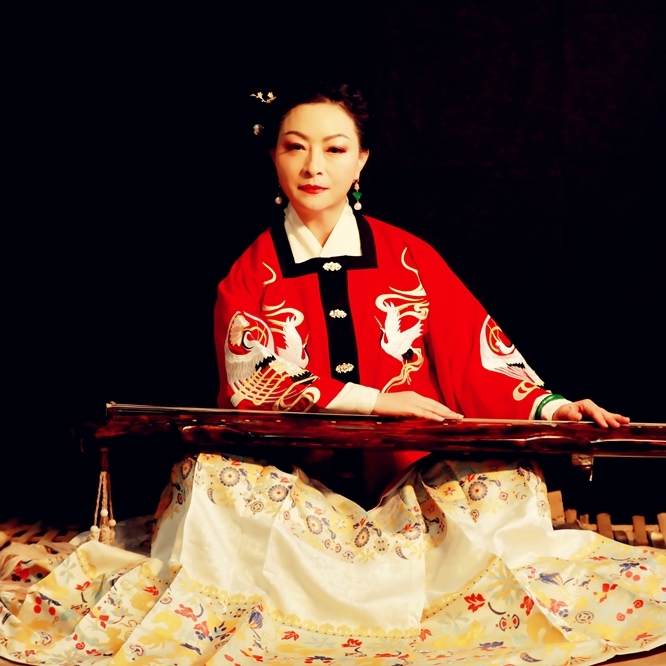Dai Ru
Organized by chen on 2022-05-05

Dai Ru, professor of the Folk Music Department of Sichuan Conservatory of Music, master tutor; member of China Volunteer Association for Literature and Art, Deputy Secretary General of Guqin Professional Committee of China Musical Instrument Association, Vice President of Asian Dulcimer Society, Vice Chairman of Sichuan Economic and Cultural Association Female Artist Branch, Sichuan Visiting professor at the School of Modern Art of Normal University, professor of MOOCs at Sichuan University, outstanding inheritor of the Chengdu Intangible Cultural Heritage List "Shu Style Guqin" project in 2016, 2017 and 2018, president of Chengdu Guqin Culture Association, volunteer of Chengdu Federation of Literary and Art Circles The head of the Guqin branch of the service group, the curator of the Chengdu Ziyou Guqin Museum, and the artistic director of the Ziyouya Orchestra.
Published and released the personal albums "Guangling San", "High Mountains and Flowing Water", "Da Hu Jia", "Li Sao", "Zhuang Zhou Dream Butterfly". Participated in the compilation of the ancient Chinese piano score series project "Xilutang Qin Tong Shen". For more than 20 years, he has independently completed the research and score work of 12 ancient songs.
Similar artist
Yang Qing, a famous guqin master and music educator, was born in August 1951.
read >>
Ni Shiyun, a native of Haimen District, Nantong City, Jiangsu Province, China's famous contemporary qin mojo, the fourth generation inheritor of the Mei 'an Qin School, the representative inheritor of the intangible cultural heritage of Jiangsu Province "Guqin art" (Mei 'an Qin school), serves as the director of the Chinese Kunqu Opera Guqin Research Institute and the executive director of the Chinese Qin Association.
read >>
Yang Qiong, the word Yu Rong, Yushan Qin school successor, South Yuqin Club president, operation aman for more than ten years, good at qin songs. He is currently the vice president of Shenzhen Guqin Association, member of Shenzhen Ethnic Orchestral Association, lecturer of Shenzhen University School of Continuing Education and so on.
read >>
Yang Zhijian, Guqin maker and performer. Born in Shanghai in July 1974. National first-class performer; representative inheritor of Shanghai intangible cultural heritage "Guqin-making skills"; vice-chairman of Shanghai Intangible Cultural Heritage Protection Association. Winner of "Shanghai Craftsman" and "May 1st Labor Medal" in 2017.
read >>
Huang Deyuan, inheritor of the intangible cultural heritage "Zhejiang style guqin" and "Wenzhou dialect recitation".
read >>
Involving musical instruments
Guqin (pinyin: Gǔ Qín) is a traditional Chinese musical instrument with a history of at least 3,500 years. Guqin is also known as Yaoqin, Yuqin and Seven-stringed Qin. The guqin has 13 emblems that mark the rhythm, and is also a ritual and musical instrument. It belongs to the silk in the octave. Guqin has a wide range, deep timbre and long aftertone.
Yangqin (Pinyin: YangQin) was introduced from Persia at the end of the Ming Dynasty. It was originally used as an accompaniment for folk art and formed a variety of genres. After nearly 400 years of circulation and evolution in my country, dulcimer has traditional Chinese characteristics and national styles in musical instrument production, performance art or music creation, and combined with local folk music, it has formed a number of outstanding A genre with local and musical characteristics.
Involved portfolio
Involved news
Organized by 陆晨 on 2025-04-17
The guqin, as a treasure of traditional Chinese culture, with its unique timbre and profound cultural background, has become a choice for many people to pursue inner peace. However, for many enthusiasts, how to squeeze out time from a busy schedule to self-study the guqin is no small challenge.
read >>
Organized by 苏肆 on 2025-04-03
In the long river of ancient Chinese music, Guqin occupies an irreplaceable position with its profound cultural connotation and unique timbre. Among the many famous Guqin songs, "Snow White" is like a bright pearl, with its quiet and elegant style, it has become a classic beloved by scholars of all ages.
read >>
Organized by 没头脑 on 2025-03-31
"Autumn Wild Geese" is a brilliant gem in the treasure house of ancient Chinese guqin music. It is not only renowned worldwide for its profound and distant artistic conception, but also has become a classic work passed down by later generations due to its unique artistic charm and profound ideological connotation.
read >>
Organized by 天井 on 2025-03-07
The guqin, as a treasure among traditional Chinese musical instruments, with its profound timbre and rich cultural connotations, has become an important medium for scholars and refined people to cultivate their character and express their sentiments. Among the numerous guqin pieces, "Pu'an Zuo" stands out as a highly representative work with its unique Buddhist background and the distant and meditative musical style.
read >>
Organized by 肖毅 on 2025-02-26
In the vast starry sky of Chinese classical music, guqin pieces occupy an important place with their profound cultural background and unique artistic charm. Among them, "The Four Scenic Views" is a highly representative work that not only showcases the exquisite and far-reaching artistic conception of guqin music but also leads the listener into a world brimming with vitality and vigor.
read >>

 渝公网安备 50010702504639号
渝公网安备 50010702504639号